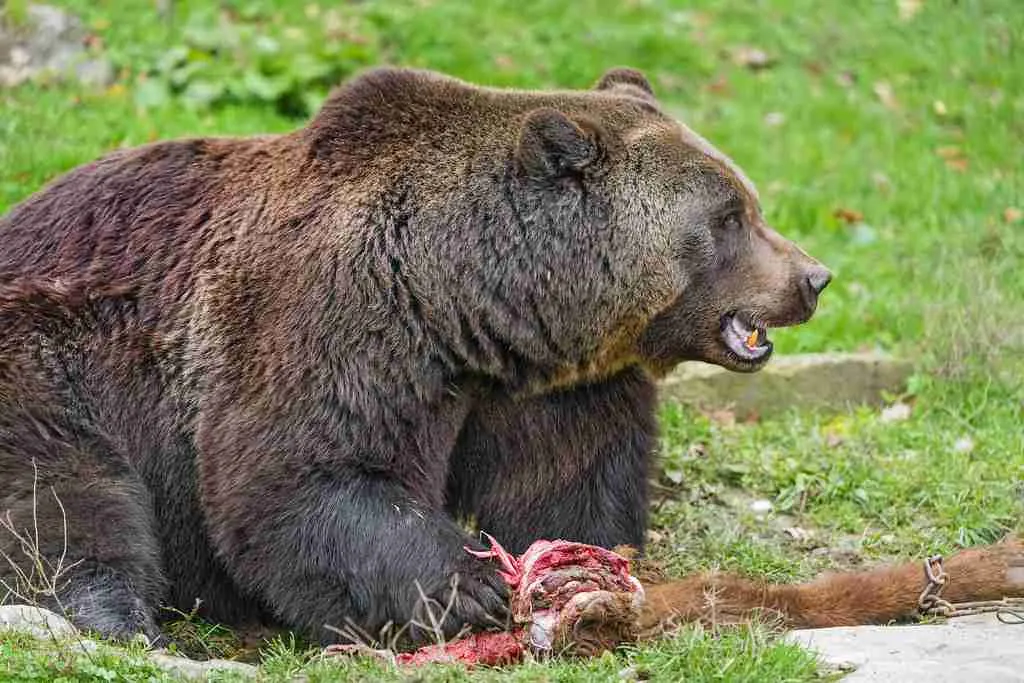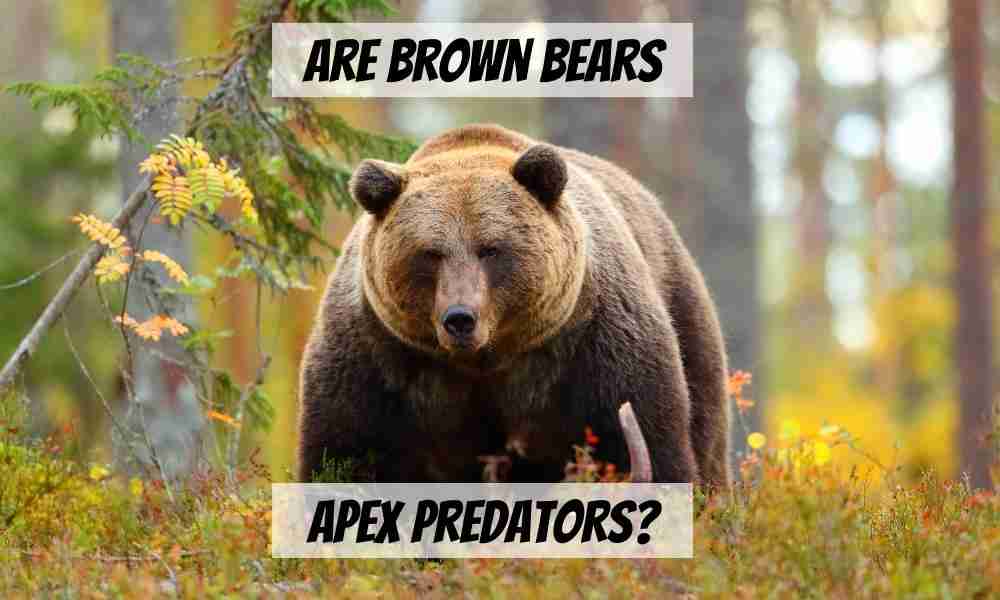Brown bears are one of the biggest land-based carnivores. And you might be wondering if they’re apex predators like polar bears.
Well, here’s what you should know:
Brown bears are apex predators. This includes both grizzlies and coastal brown bears. They occupy the top of their food chain and don’t have natural predators.
These bears are super strong and dangerous. They have a wide range of diets and a great appetite depending on the season of the year.
Brown bears are excellent hunters and can go to any length to feed themselves.
Now that you know this, let’s take a more detailed look at apex predators. Doing so will help us understand why brown bears are part of them.
Keep reading to find out more!
What are Apex Predators?
Apex predators are animals that occupy the highest position in their respective food chains. They are good hunters and have no natural predators.
These animals are important for maintaining the populations of other species, thus preventing any one species from dominating the environment.
They are usually carnivorous and are best known for their strength and agility. This gives them an edge when hunting and capturing their prey.
Furthermore, apex predators are larger and more powerful than other predators. They have sharp teeth and strong jaws which help kill and eat any animal they catch.
Are All Brown Bears Subspecies Apex Predators?
Yes, all brown bear subspecies are apex predators. They are the king of their food chain, preserving the natural balance of their environment.
Brown bears (Ursus arctos) have several subspecies. Each subspecies has its unique characteristics, geographic location, and evolutionary adaptations that enable it to survive in its habitat.
They share similarities as members of the same species. However, they display differences in size, behavior, and ecological roles determined by their particular environment.
With this knowledge, we’ll discuss the primary subspecies of brown bears and their position as apex predators.
Are Grizzly Bears Apex Predators?
Yes, grizzly bears are apex predators. They are found at the peak of their food chain and they have no natural enemies.
They are inland bears with their characteristic shoulder hump. Grizzly bears are spread across different parts of North America, including Alaska, western Canada, and the northwestern United States.
They are known for their strength and resilience. Their ability to hunt and take down large animals such as moose or elk has earned them the title of apex predator.
Additionally, their size, predatory instinct, and appearance contribute to their being top predators. Even when faced with potential predators, these qualities make them intimidating.
Are Kodiak Bears Apex Predators?

Yes, Kodiak bears are apex predators. They occupy the highest trophic level of their food chain and are not hunted by any animal for food in their coastal habitat.
These subspecies of brown bears live in the coastal region and are well adapted to their environment.
They are the largest of all brown bears and some individuals weigh up to 1,800 pounds – that’s like carrying a small car!
Kodiak bears are only located in the Kodiak Archipelago in Alaska. Their isolation and abundant food sources help them to maintain their position as an apex predator.
With access to nutrient-rich salmon streams, Kodiak bears can become exceptionally large and demonstrate excellent hunting skills.
5 Reasons Why Brown Bears Are Considered Apex Predators
1. Brown Bears are Big and Strong
Brown bears are one of the biggest land-based carnivores. Adult males typically weigh more than 1,500 pounds and stand up to 10 feet tall.
Their impressive size and strength give them an advantage over most other creatures in their habitat, allowing them to be in control of everything.
2. They Have Razor-Sharp Teeth And Claws
Brown bears have powerful and sharp claws that are adapted for a variety of purposes. Their front claws, particularly those on their forelimbs, measure 4 inches in length and are curved.
These claws are highly effective for digging, creating burrows, and tearing apart vegetation or prey.
Additionally, brown bears have a set of well-developed teeth with a bite force of 1200 -1500 psi. Their canines are elongated and sharp, allowing them to grasp and hold onto prey.
The premolars and molars have specialized shapes that help them to grind and crush food, including plant matter and bones.
3. Brown Bears are Skilled Hunters and Foragers
Brown bears are incredibly clever hunters. They are indeed curious and smart creatures with a great sense of smell to locate their prey.
These animals can detect the smell of their prey from a far distance and then follow the scent until they find the animal. Afterward, they will use their sharp claws to catch and kill it.
Brown bears are known to hunt large animals such as elk, deer, and moose. Some other times they feed on small mammals, fish, insects, vegetation, and berries.
These hunting skills make them apex predators and keep them at the top of the food chain.
4. They Do Not Have Natural Predators
Brown bears are the rulers of their ecosystems. They do not have natural predators to challenge them, rather, they control the population of other species through predation.
While they may occasionally encounter other large carnivores like wolves or tigers, they are usually too tough for any animal to prey on.
With their size, strength, and defensive features, these bears are ultimate predators in their habitat. No animal dares to mess around with them!
5. Brown Bears Play Important Roles In The Ecosystem
As apex predators, brown bears have a major effect on their habitats. They keep their prey populations in check and help keep the ecosystems balanced.
Their presence and hunting habits impact the variety of life in the places they live. This influences the structure and types of plants in the area, as well as the way they grow.
Brown Bear Food Chain – Diagram

What are the Predators of Brown Bears?
Adult brown bears do not have any natural predators since they occupy a significant position in their ecosystems.
However, there are a few animals that can be a threat to their cubs, injured, or dead individuals. They include:
Wolves
Wolves are the most frequent predators of brown bears. They usually hunt in groups and can even take down full-grown brown bears.
In certain areas where brown bears and wolves coexist, there can be occasional clashes between the two species. Wolves would mostly target brown bear cubs that are far away from their mothers.
A few times, they work together as social predators to harass and fight adult brown bears.
This happens especially when they are protecting their territory or when they come across carcasses.
Tigers
Tigers are powerful predators capable of taking down larger animals, and they may opportunistically target vulnerable bear cubs.
In the Russian Far East, the ranges of brown bears and Amur tigers overlap, and tigers prey on brown bears.
The attack is particularly on cubs, owing to the information from previous occurrences.
Other Brown Bears
Adult male brown bears, referred to as boars, can sometimes be a threat to younger or smaller bears, including cubs. This happens especially if the cub is not their own.
Bigger and more dominant brown bears may prey on smaller or weaker ones for food during fights over territory or food and resources.
Take Note:
Humans can be a major threat to brown bears even though they are not their natural predators. Hunting them for their fur and destroying their habitat can be dangerous to them.
Additionally, clashes with humans, especially in areas where bear populations and human settlements coexist, can hurt the population of brown bears.
What Do Brown Bears Prey on?
The habitat of brown bears has a considerable influence on their dietary habits. Brown bears are highly adaptable and their diet can differ depending on the particular features of their habitat.
Coastal brown bears have access to marine resources that significantly shape their diet.
They are mainly meat eaters and also depend on the yearly salmon runs, feeding on the nutrient-rich fish during their migration.
Inland brown bears, such as grizzlies, have a more diverse diet. They eat a combination of plant material and fungi. In these habitats, they may also hunt small mammals.
Plants
- Berries – Brown bears love berries, and they will eat a range of berries, such as blueberries, raspberries, strawberries, and blackberries.
- Nuts – Brown bears consume a variety of nuts, including hazelnuts, walnuts, and acorns.
- Grasses – In springtime, brown bears will eat grasses, particularly when they are young and succulent.
- Leaves – In autumn, brown bears tend to consume leaves, particularly those from deciduous trees.
- Roots – Brown bears will eat roots, such as carrots, potatoes, and onions.
Animals
- Elk
- Moose
- Caribou
- Muskoxen
- Carrion (flesh of dead animals)
- Fish
- Brown bears are adept swimmers and can capture fish in rivers and lakes.
- Insects (e.g. ants, termites, and beetles).
- Eggs – Brown bears will also eat the eggs of birds and other animals.
- Rodents
- Squirrels – Brown bears are known to climb trees to hunt for squirrels.
- Marmots
- Deer
Do Brown Bears Eat Other Bears?
Yes, brown bears eat other bears. There have been rare occasions where brown bears have been spotted eating black bears. One such incident was when a grizzly was seen eating a dead black bear.
The bear is known as Grizzly Bear No. 122 (The Boss). It ate the black bear on Banff’s Sundance Canyon trail because it was hungry. It took advantage of the available food source to feed itself.
There are other less documented cases of brown bears eating other bears. In some cases, they have been seen eating cubs of other bear species.
However, this is a rare occurrence. It usually happens when the brown bear is severely hungry or feels threatened by the other bear.
Related Questions:
Are Black Bears Apex Predators?
Yes, black bears are considered apex predators. They are at the top of the food chain in their habitat and have no natural predators.
These animals are powerful, and adept hunters. Their diet consists of a variety of items, including berries, deer, elk, insects, and other small creatures.
Are Polar Bears Apex Predators?
Absolutely! Polar bears are apex predators. The top predators in the Arctic food chain, and they don’t have any natural predators.
They are renowned for their hunting skills, sharp teeth, and strong jaws, which they use to hunt large animals like seals and whales.
Are Giant Pandas Apex Predators?
Yes, giant pandas are apex predators in their habitat. They don’t have any natural predators that hunt them for food.
Although they are mainly herbivores, they have sharp teeth that they use to hunt and capture small animals such as pikas, rats, and other rodents.
Are Sloth Bears Apex Predators
Yes, sloth bears are apex predators. They occupy a critical position in their environment and don’t have any natural predators.
Most times, they eat ants and other insects but also eat rodents, birds, and carrion. They are essential to the environment, ensuring that the number of plants and animals in their habitat is in balance.
Recap
In summary, brown bears are apex predators. This includes all subspecies — inland and coastal.
In addition, these animals are top predators because of the following factors:
- Brown bears do not have any natural predator
- Brown bears are large and have strength that helps them overpower their prey.
- They have sharp teeth and long claws which they use to hunt and eat any animal they capture.
- They are great hunters
- They help to regulate the number of animals in their coastal and inland environments.
Despite all these factors, brown bears have predators like wolves, tigers, and other brown bears. These predators mostly hunt cubs. They know better not to mess with the adults unless they want a fight!
Brown bears are apex predators who hunt and eat anything they come across if they are hungry. But do you think they are more dangerous than black bears?
Find out in our article ‘’Are Brown Bears More Dangerous Than Black Bears’’.
Sources:

